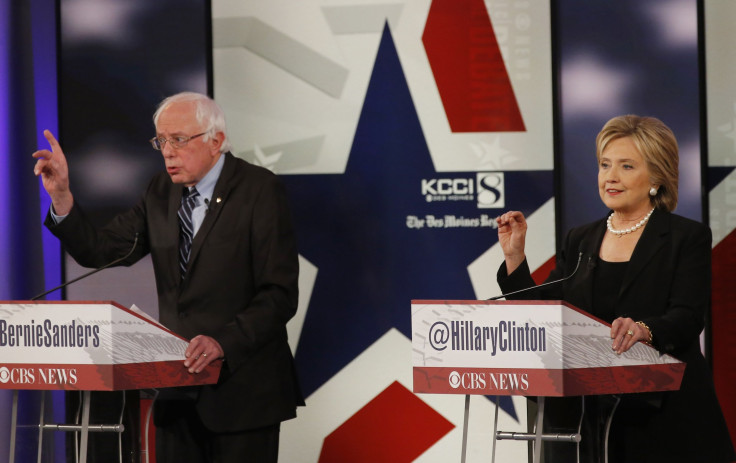Paris Attacks: Syrian Refugees Welcomed By Democrats, But How Have Terror Attacks Changed Public Opinion?

During the second Democratic presidential debate Saturday, all three candidates agreed that the United States should accept Syrian refugees and do what it can to help people fleeing war-torn countries. But after the terrorist attacks Friday night in Paris, Hillary Clinton added that the U.S. must screen immigrants to ensure they are do not pose threats to the nation’s security.
After shooting and suicide bombing attacks that killed 129 people and wounded hundreds more, French authorities said Saturday that at least one of the assailants was a Syrian who entered Europe through Greece with a group of refugees. This information has ignited longstanding fears by some, particularly Republicans, that bringing Syrian immigrants to the U.S. could present an uncontrollable national security threat.
“I think that is the No. 1 requirement,” Clinton said Saturday, referring to screening Syrian refugees before they enter the country. “I also said that we should take increased numbers of refugees. The administration originally said 10 [thousand]. I said we should go to 65, but only if we have as careful a screening and vetting process as we can imagine, whatever resources it takes because I do not want us to, in any way, inadvertently to allow people who wish us harm to come into our country.”
Her opponents, Vermont Sen. Bernie Sanders and former Maryland Gov. Martin O’Malley, took stronger stances for helping refugees.
“I believe that the United States has the moral responsibility with Europe, with Gulf countries like Saudi Arabia, to make sure that when people leave countries like Afghanistan and Syria with nothing more than the clothing on their back that, of course, we reach out,” Sanders said. “Now, what the magic number is, I don't know, because we don't know the extent of the problem. But I certainly think that the United States should take its full responsibility in helping those people.”
O’Malley, who has called on President Barack Obama to increase the number of refugees allowed into the United States, stood by his support for refugees but evaded setting a precise number after the Paris attacks.
“I was the first person on this stage to say that we should accept the 65,000 Syrian refugees that were fleeing the sort of murder of ISIL, and I believe that that needs to be done with proper screening. But accommodating 65,000 refugees in our country today, people of 320 million, is akin to making room for 6.5 more people in a baseball stadium with 32,000,” he said.
When pressed by the moderator about whether the latest attacks would alter his target of 65,000 refugees, O’Malley said: “I would want us to take our place among the nations of the world to alleviate this sort of death and the specter we saw of little kids' bodies washing up on a beach.”
Should USA do more to help the Syrian refugees fleeing civil war?
— Greta Van Susteren (@greta) November 13, 2015In September, when Obama announced the United States would accept 10,000 Syrian refugees, his plan was met with sharply divided reactions. Democrats and liberal activists called on him to increase the number the U.S. would take in, while Republican responses at the time ranged from cautiously accepting to harshly critical, with many raising concerns about potential security issues.
However, despite politicians’ range of reactions, public opinion was never very favorable on this topic. A Huffington Post/YouGov poll conducted in September around the time of Obama’s announcement found that 46 percent of Americans opposed allowing more Syrians to move to the U.S. and just 39 percent favored the policy. A CNN/ORC poll around the same time found slightly more support for taking in refugees -- there, support for accepting them was at 55 percent with 44 percent opposed.
But even a proposal for the U.S. to send financial support to refugees via charities or the European Union had only 50 percent support in the YouGov poll. Half of respondents said the U.S. does not have responsibility to take in Syrian refugees, and 35 percent said the Syrian refugees were Europe’s problem and that the U.S. did not have a role to play.
The responses were sharply divided along party lines, with 57 percent of Democrats saying the U.S. should take in more refugees and 69 percent of Republicans opposing. Independents were slightly more likely than not to oppose accepting refugees. These results were similar to those found in a Pew Research survey released at the end of September, which found partisan divides in responses to refugees.
While the Paris attacks are recent enough that it will take time for new polls to be conducted, Republican lawmakers and presidential candidates have already responded strongly, calling for increased military power against ISIS and a crackdown on immigration and security. Former Arkansas Gov. Mike Huckabee called Saturday for the U.S. to close its borders and said the country must protect itself against threats.
On Twitter, many people took to expressing concerns about the U.S. plan to accept Syrian refugees. Some responded specifically to the Paris attacks, while others disparaged refugees and immigrants more broadly.
Øbama should immediately announce a halt to all "refugees" coming to America. He won't. Why not?
— Neal Boortz (@Talkmaster) November 14, 2015Clinton says we have lots of room in America and could take in a million refugees. IS SHE KIDDING US?
— DJ Lewis (@umpire43) November 15, 2015After attacks such as the ones in Paris, many Muslims fear a backlash, and so people have also taken to social media to denounce the attacks and defend refugees, who will still need places to live in the coming months.
Statistics over Stereotypes. #ParisAttacks pic.twitter.com/TmsDGPG30Z
— Khaled Bey (@KhaledBeydoun) November 14, 2015The refugees in Europe are victims of the same brutal extremism that devastated France today. Empathy and help must be for all afflicted.
— Sarah Kendzior (@sarahkendzior) November 14, 2015© Copyright IBTimes 2025. All rights reserved.






















